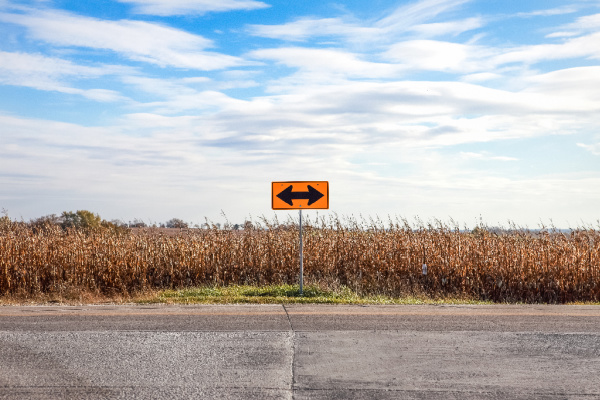Escaping 1980 – Advice for the Next Farm Crisis

Lessons Learned from the 1980s Farm Crisis
Last month, the hosts of AEI.ag’s Escaping 1980 podcast held a virtual event that went behind the scenes of the popular podcast series to discuss lessons learned and the implications for 2021. The conversation opened with a question for participants: If you could go back in time, what advice would you give yourself to better prepare for the 1980s farm crisis?
Each host wrote about their takeaways in-depth on AEI Premium. Brent’s lessons learned can be succinctly summed up as: 1) use debt in moderation; 2) try to run counter-cyclical to the crowd; and 3) don’t underestimate the likelihood of extreme events.

What would you want the 1970s-version of yourself to know? Surely, some advice would be more useful than others. “Back To The Future”-style, very specific guidance, like “corn prices will peak in 1974,” “don’t buy land in 1975,” or “Jimmy Carter will embargo grain” only go so far.
That’s because history rarely repeats itself exactly. So, we need to be more strategic in the lessons we glean from the past and the advice we take to heart while planning ahead.
During the webcast, Escaping 1980 hosts Brent, David, and Sarah Mock noted three key takeaways that are relevant not just to navigating the situation farmers found themselves in during the 1980s, but beyond.
1. A lack of data makes decision-making more difficult.
In the 1980s, bankers literally had piles of paperwork to sift through while trying to identify how many farms would be upside down if farmland values continued to fall. Even with the “modern” information systems available in the ‘80s, there was still a lack of data. That limited access directly affected both farmers’ and policymakers’ decision-making.
We saw this phenomenon at work again during the 2008 financial crisis and, most recently, during the pandemic. After each of these emergencies, we created a new set of tools, technologies, and policies to address the situation. But still, time and time again, we find ourselves unprepared for the next plot twist.
This brings to mind a quote that is referenced during Escaping 1980 – despite our search, systemic risk has a way of finding us, and in new ways.

2. We miss the point when we focus on overly simplistic – and wrong – summaries of very complicated situations.
What caused the 1980s farm financial crisis? The Carter administration’s 1980 grain embargo? Too much debt? Paul Volcker and soaring interest rates? These are factors often cited, or blamed, but the crisis was the result of all of these factors, and others.
Often, attempted analysis of crises results in overly simplistic versions of reality. And often, the wrong conclusions – that is, persuasive conclusions not based on facts – take hold. Many of us rest on our “gut feeling” to distinguish “good” information versus “bad” information… but that system is far from foolproof.
If we only focus on one factor of a much more complex scenario, we miss the point. And the more complicated the crisis, the more this becomes an issue.
Hindsight bias can also feed into this problem. When reflecting on a situation, think about the information you (and policymakers) had at the time. It is important to keep in mind that hindsight is not always 20/20. The outcome you experienced was probably not inevitable.

3. Somehow, we keep getting surprised.
Every time we experience a catastrophic event like the 1980s farm crisis… or a global pandemic… or a widespread electric outage from an ice storm… our natural reaction is to be surprised. But why?
It’s true that we will never fully know what the future holds. But we can be more proactive in considering potential scenarios – thinking beyond the sound bites that defined the crisis – to put safeguards in place against what Former Defense Secretary Donald Rumsfeld famously coined as “the unknown unknowns”.
As podcast host Sarah Mock explained during the Escaping 1980 webcast: The best prepared are those who are able to think through how they would react in every possible situation. Having a resilient business might not feel as good as buying a new combine, or investing in land, or having something else tangible to point to – but that resiliency is how we will survive the “next 1980.”
Advice For Your Future Self
So, what guidance will you leave yourself now to assist in the next crisis affecting agriculture? (Because, yes, there will always be another one… we just don’t yet know what it will be.) Here are some tips to help.
Good advice:
- …is founded on good data.
- … is evidence-based, rather than based on a gut feeling.
- … includes actionable, measurable steps.
- … is not so specific that it only fits one situation.
- … avoids hindsight bias by not assuming that the results you experienced before are the only possible outcome.
- … avoids confirmation bias by considering points of view that differ from yours.
The 1980s farm financial crisis affects everyone involved in U.S. agriculture today, in one way or another. We either lived through the crisis personally, or we’ve grown up in the long shadow of the crisis. The goal of Escaping 1980 was to unpack that crisis so we might be able to prepare and positions ourselves – personally and professionally – to be more resilient in the future.
Watch the full Escaping 1980 live recording here. Listen to all seven episodes of the podcast here. You can also invite the team to speak at your next event.
